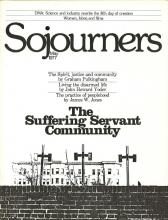The real hope of reconciliation between races and cultures in our world is wrapped up in how we, the people of God, see ourselves. Do we see ourselves only as readers of scripture, or as fulfillers of the prophecies and promises God has made concerning this world? Do we see ourselves simply as people who have the right values and principles, or as preachers of a powerful gospel that can itself accomplish its objectives including reconciliation?
I believe the only hope for reconciliation between races and cultures is that the people of God recognize themselves as the body of Christ in the local neighborhood, the replacement of Jesus' body on earth. The purpose of this body, the church, is to reconcile people to God and to each other. Christians must see themselves as God's tools and the church as God's workshop for reconciliation.
Paul understood the gospel's implications of reconciliation better, perhaps, than anyone else. He was one of the founders of the completely cross-cultural, multiracial church at Antioch. So manifest was God's glory there that people had to begin calling them by a different name—Christians.
In Colossians, Paul outlines the hope of reconciliation through the church. He congratulates the believers on the love they have for all the saints (Colossians 1:4) and reminds them that membership in the body cannot be determined on the basis of color, nationality, position, or sex (Colossians 3:11, Galatians 3:28).
Paul knew that Christ was the "image of the invisible God"(Colossians 1:15) and as we become his body, we together become "renewed in knowledge after the image of its creator" (Colossians 3:10). We are all one for we are in him, "and in him all things hold together" (Colossians 1:17).
Read the Full Article

